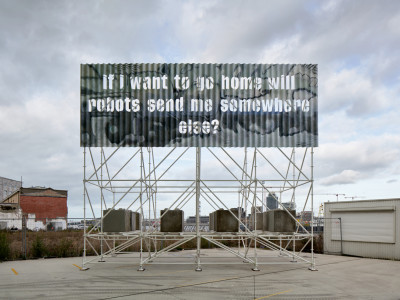
Flaka Haliti
— If I Want to Go Home Will Robots Send Me Somewhere Else?
- –
- Station Oostende - Platform 3
_If I Want to Go Home Will Robots Send Me Somewhere Else? _is the curious question posed on this large billboard installed at Ostend’s railway station. Cuts in the corrugated steel plates — reminiscent of shipping containers — enable the viewer to see the changing sky behind the letters. Haliti drew her title from the “true or false” section of an online platform called “#rumours about Germany – facts for migrants”. On this website, one can find answers to questions that were supposedly submitted by asylum seekers. In Haliti’s alienated version, the word “robots” replaces “Germany” and “I” replaces “you” — a play on words that conveys a split sense of technological optimism and the uncertainty of the self in a machine-led future, beyond the control of human-dictated territories and borders.

Flaka Haliti (°1982, Kosovo) works predominantly with sculpture and installation. Her practice explores digital post-humanity in an humourous and analytical way, while occupying in-between states that open up a performative space for counterpoetics. Flaka Haliti lives and works in Munich.

The art trail Endless Express_ _is spread over different destinations along the railway line between Ostend and Eupen. Taking the public sculpture Esprit ouvert by Tapta as a symbolic point of departure, seven artists were invited to present new works around the stations and tracks. With the train as a unifying element, they explore the networked histories embedded in this landscape and entangled with this line. With new works by Che Go Eun, Inas Halabi, Flaka Haliti, Chloé Malcotti, Sophie Nys, Marina Pinsky and Laure Prouvost.
The Ostend-Eupen railway line is the longest in Belgium, traversing its three official language regions in about three hours — from the royal seaside resort in the west to the industrial river valley in the east, with the capital of Brussels in the centre. The train introduced shortly after Belgium was founded in 1830 — speaks in a broader way of industrialisation, the promise of progress, and how these forces have transformed this country.
The artists included in this exhibition are all based in Belgium or its neighbouring countries. Some imagine the train as a mythical creature re-enchanting the world, others question the notion of thinking in a straight line, as well as labour and its rhythms, or playfully disrupt the clockwork time that helped shape the society of speed we live in today.
Curator: Caroline Dumalin



